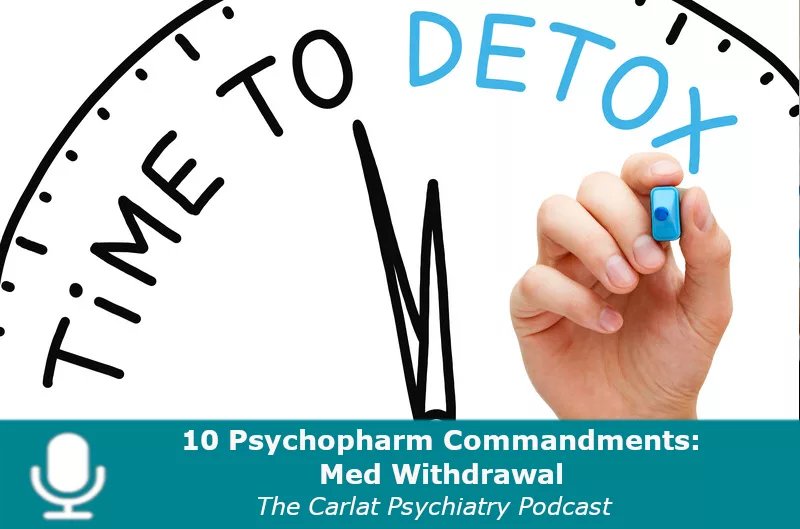When to stop meds quickly, and when to do it slowly, in #2 of our 10 Commandment series.
Published On: 09/26/22
Duration: 8 minutes, 40 seconds
Transcript:
Kellie Newsome: Today, the second commandment of psychopharmacology: Avoid abrupt cessation of psych meds.
Chris Aiken: Welcome to the Carlat Psychiatry Podcast, keeping psychiatry honest since 2003. I’m Chris Aiken, the editor in chief of the Carlat Report.
Kellie Newsome: And I’m Kellie Newsome, a psychiatric NP and a dedicated reader of every issue.
CHRIS AIKEN: In this series of 10 commandments we are going to talk about a lot of meds and med combos to avoid, but what if your patient is already on them? There you have to weigh the risks. How dangerous is it to stay on the med, tapering slowly, and how dangerous is it to risk withdrawal, stopping it abruptly. Most of the time, we favor tapering slowly. But there are times when abrupt cessation is the answer, like when serious medical issues are at stake such as lamotrigine-rash or liver toxicity on Depakote. Or when your patient has only been on the med for a brief time – no more than 1-3 months – and they are having uncomfortable side effects. Or when the drug has a long half life – we’ll get to those at the end.
KELLIE NEWSOME: When we think about withdrawal on psych meds – or discontinuation syndrome to use the more watered-down term that the pharmaceutical industry prefers – two meds come immediately to mind: Benzos and serotonergic reuptake inhibitors like SSRIs and SNRIs. These are the ones that cause the most discomfort for patients, and in the case of benzos it can be dangerous – seizures.
All psych meds have some withdrawal syndromes, even mirtazapine and tricyclics, but in most cases it is mild or rare. When you’re concerned about withdrawal, the best approach is to lower the dose faster at first and then by slower and smaller increments as you reach the lower ranges. This is more art than science. Start by lowering every 2-4 weeks, and extend that interval if withdrawal is difficult.
If a patient is abusing benzos, there's a risk they will take the taper all at once or use it with alcohol or opioids. In those cases, consider hospitalization, have trusted family dispense the pills, or use an anticonvulsant like pregabalin or gabapentin along with a few doses of a long-acting benzo like diazepam.
CHRIS AIKEN: I’ll add antipsychotics to the meds we should worry about withdrawal symptoms on. There’s evidence that in some patients the dopamine system accommodates to the dopamine blockade by becoming hypersensitive, then when the dopamine blocking antipsychotic is yanked away their hypersensitive dopamine receptors over-react to any dopamine in the nerve terminal, causing sudden relapse of psychosis or sometimes new psychotic symptoms in people who have never had psychosis before. This dopamine hypersensitivity theory also explains withdrawal dyskinesias - where neuromuscular side effects like tardive dyskinesia can paradoxically worsen when you stop an antipsychotic.
Even if your patient doesn’t have withdrawal symptoms, stopping meds abruptly puts patients at greater risk of relapse. We don’t have a lot of research on stopping meds, but what is out there tells us this: You need to allow at least 2 weeks to taper off most medications. Stop any faster and you double the risk of relapse. One exception is if they've only been on the med briefly (1-3 months). Longer treatment durations, higher doses, and more fragile patients may require slower tapers.
KELLIE NEWSOME: Wait, I got one more med where a slower taper is beneficial: Lithium. If you stop lithium abruptly, your patient may have rebound depression – the suicide risk also goes up with abrupt cessation, in part because lithium has anti-suicide properties, but also because of a poorly understood withdrawal phenomenon in the first few weeks after stopping it. The textbook advice is to lower lithium off over at least a month. We like to go even slower, over 3-9 months, depending on the patient.
CHRIS AIKEN: It takes 5 half-lives for a drug to fully clear from the patient’s system, and most psych meds have a half life around 24 hours, which means 5 days. But there are a few you need to know with long half lives – these are the ones where you might be able to get away with stopping it faster. Here are the most common long-half life drugs:
CHRIS AIKEN: Antidepressants: Vortioxetine/Trintellix (3 days), fluoxetine/Prozac (1–4 days; active metabolite 7–10 days). And there’s one tricyclic with a long half-life: protriptyline, 2-8 days.
Atypical Antipsychotics: Cariprazine/Vraylar (2–4 days; active metabolites up to 3 weeks), aripiprazole/Abilify (3 days), brexpiprazole/Rexulti (4 days)
And one more where the long half-life can make a big difference: Disulfiram/Antabuse. This anti-alcohol drug has a half life of 2-3 days, which means that patients have to wait at least 2 weeks after stopping it before they can safely drink alcohol again. That’s a good thing – it provides some time to reflect before they go back to drinking.
KELLIE NEWSOME: Join us next time where we learn how to avoid lithium toxicity in our third psychopharm commandment. Until then, catch us on Thursdays for a new edition of the Podcast stream – throwback Thursdays. We’re dusting off our old episodes, updating the content, and adding CME credits. And give yourself some CME credit for listening to this episode through the link on the show notes.
__________
The Carlat CME Institute is accredited by the ACCME to provide continuing medical education for physicians. Carlat CME Institute maintains responsibility for this program and its content. Carlat CME Institute designates this enduring material educational activity for a maximum of one quarter (.25) AMA PRA Category 1 CreditsTM. Physicians or psychologists should claim credit commensurate only with the extent of their participation in the activity.


_-The-Breakthrough-Antipsychotic-That-Could-Change-Everything.webp?t=1729528747)



